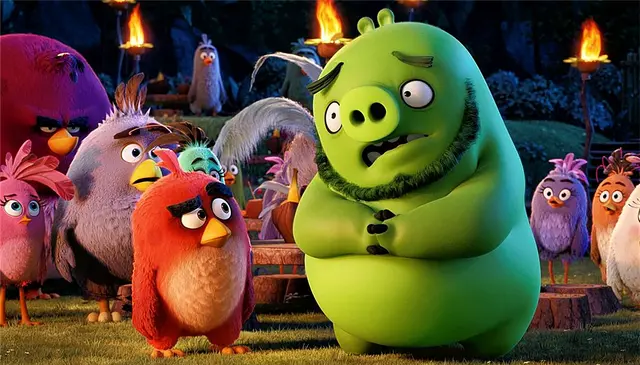The producers of “The Angry Birds Movie” are taking a page from the unlikely playbook of “Iron Man” and “The Avengers” for their big-screen version of the mobile-game series.
Rovio Entertainment Ltd., the Finnish company behind “Angry Birds,” decided four years ago to take a gamble: Rather than license its characters to a Hollywood studio in exchange for a percentage of the proceeds, it would finance a $73 million movie with its own cash. That means most of the profits or losses from the film will accrue to its bottom line.
The high-risk, high-reward approach is unusual in Hollywood, where even large companies such as Lego A/S andHasbroInc.typically rely on studios to finance their films. If widely adopted, however, Rovio’s model—similar to the approach that made “Iron Man” pay off for Marvel—would pose a risk to studios that count on long-term control of franchises to drive their bottom lines.
“People think this is about the financial upside, but it’s really about controlling your own destiny,” saidDavid Maisel,an executive producer of the “Angry Birds” movie. Since opening in some overseas territories last Friday, it has grossed a solid $43 million.
Sony Pictures Entertainment is releasing and marketing the movie, which opens in the U.S. Friday, but had no creative oversight.
Mr. Maisel, 53 years old, first approached Rovio in 2011 after seeing his then-85-year-old mother play “Angry Birds” on her iPad. His pitch was simple: He wanted to do for the Angry Birds what he had done for the Avengers.
A former chairman of Marvel Studios, the movie division of the comic book company now owned byWalt DisneyCo., Mr. Maisel 12 years ago conceived and led a then-novel plan for an intellectual property owner to self-finance films based on its characters.
The company shocked many in Hollywood by producing a string of hits, starting with 2008’s “Iron Man.” The next year Disney acquired Marvel Entertainmentfor $4 billion, roughly double its value when the motion picture plan began.
Rebuilding value is top of mind for Rovio, which released 13 mobile games in the past seven years, some based on films such as “Star Wars” and “Transformers.”
It has struggled recently due to new competition and an oversaturation of toys and T-shirts featuring its characters. Last year, it laid off more thanone-third of its workforceand reshuffled management.
The privately held company reported anoperating loss of €13 million($14.7 million) and a 10% revenue drop to €142 million in 2015, partly due to the costs of making the film.
Mikael Hed,the head of Rovio’s animation business and the company’s former chief executive, said a feature film was critical to make “Angry Birds” an entertainment franchise and not just a game. Because the furious avians are the company’s primary asset, he added, he rejected offers from Hollywood studios and joined with Mr. Maisel to maintain creative control.
“I’ve never felt it was a tremendous gamble,” Mr. Hed said. “I have met people who feel that way, like our board of directors.”
To preserve the movie as a special event, Mr. Hed agreed to several conditions requested by Mr. Maisel: Before the movie’s release, Rovio wouldn’t produce television episodes or Internet videos longer than three minutes; the characters would never talk or be seen with arms and legs; and their back stories would be kept secret.
Rovio is releasing new toys and other consumer products tied to the movie, said Mr. Hed, but is being conservative with its rollout based on its past mistakes.
Mr. Maisel said he wasn’t concerned that the popularity of “Angry Birds” is waning, pointing out that with more than 3 billion downloads, it has more global awareness than Iron Man before his first movie.
The filmmakers said the lack of backstory in the game was an asset.
“Most properties with awareness of this size have a well-defined mythology that it’s your job to carefully translate,” said producerJohn Cohen.“With ‘Angry Birds,’ it was a pretty blank slate.”
To make the movie—a comedy that explains why the birds became so angry—Mr. Cohen copied a formula he used on the 2010 hit “Despicable Me” from Illumination Entertainment, which produces animated films forComcastCorp.’s Universal Pictures.
Writing, storyboarding and other development was done in a small Los Angeles office, while other artists contributed from around the world and animation production was handled bySonyPictures’ Imageworks division in Vancouver, Canada.
The “virtual studio” approach allowed Rovio, like Illumination, to make its movie for less than half of what Disney sometimes spends on its animated pictures, produced by full-time employees.
The Imageworks deal was separate from the one for Sony to release the movie, under which it will receive at least 8% of the film’s revenue.
“It’s a good deal economically for us, but if it’s a hit there are other benefits,” said Sony’s movie chief,Tom Rothman,citing the opportunity to play trailers for July’s Sony-owned “Ghostbusters” reboot in front of “Angry Birds” and to release potential sequels.
Mr. Maisel said if the film is successful, he hopes to make sequels and spinoffs at a cadence of two every three years, beginning in 2019. Given the key role he played selling Marvel to Disney, however, he may also be thinking of the potential for box office success to increase Rovio’s attractiveness to a possible buyer.
In addition to serving as executive producer of the movie, Mr. Maisel is a special adviser to Rovio. That makes him a shareholder in the company, he said, along with compensation for his work on the film.
(THE WALL STREET JOURNAL)
 简体中文
简体中文

